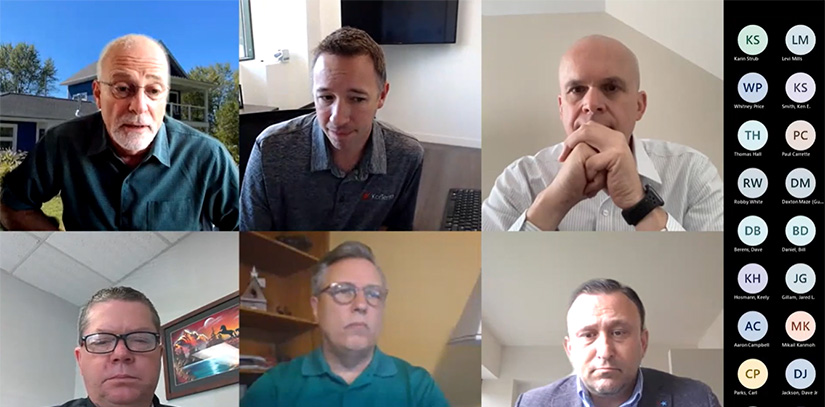Excavation Safety Alliance Town Hall: Are you prepared for the Infrastructure Bill impacts on the damage prevention industry?

KorTerra CRO Jim Plasynski recently moderated an Excavation Safety Alliance Town Hall session hosted by Infrastructure Resources. ESA Town Halls are open forums to discuss concerns and present potential solutions for improving damage prevention and excavation safety. The session was attended by more than 110 stakeholders, and panelists included George Kemp of MetroNet, Mark Frost of Julie, Inc., Stephen Schafer of FirstEnergy, Shane Bryan of Ritter Communications, and Harley Hartman of ELM Utility Services. The discussion centered around the Infrastructure Bill’s effects on the damage prevention industry.
One of the top challenges panel members shared experiences about was that they are already experiencing increased ticket volume. As a result of these increased volumes, an already taxed system is beginning to see an increasing amount of late locates. Utility operators are experiencing problems addressing periods of high ticket demand, and most express concern that the difficulty of keeping up with locate requests will continue to worsen. This puts utility owners’ compliance at risk and poses a safety risk to all stakeholders.
Contract locating organizations known for handling a high volume of tickets are experiencing challenges due to the recent increase in ticket volume, especially with labor shortages. It takes significant time and resources to bring qualified candidates through the door and complete training, as well as a shadowing period that involves new locators being supervised by more experienced locators. Additionally, contract locators generally do not know what volume will look like from one day to the next. A team could be appropriately staffed and complete all tickets efficiently one day, then receive hundreds or even thousands more tickets the next with the same amount of staff to complete the work. A relief valve is needed for those instances, and it often comes in the form of prioritizing communication with excavators in an attempt to agree upon an alternate timeline.
While not all states have provisions within the law that allow for facility owners and excavators to mutually agree upon a locate being performed after the initially scheduled dig date, some states do allow for this. In those states, well-documented agreements with excavators on a project timeline and starting location can create a workable solution for both parties. In states that do not allow this form of agreement, the lack of latitude creates a situation of non-compliance for facility owners which can result in penalties and fines.
Several panelists emphasized the importance of industry relationships and communication. They agreed that it is crucial to partner with fellow stakeholders to provide forecasting information for the year ahead, address concerns each party has, and proactively establish mutually beneficial solutions. Some excellent examples of addressing the ticket volume increase as a result of the Infrastructure Bill include solutions such as:
- Providing advanced notice of major increases in volumes
- Maintaining different processes for large and complex dig projects
- Fostering broader stakeholder communication/transparency
- Identifying areas of extreme locate demand then notifying excavators when a dig site is within such an area
- Providing educational materials for excavators from out of state to help quickly educate them on differences in the law
Retention and recruiting are also common areas of concern for panelists. Recent years have shown higher turnover rates for the locator profession. This turnover is even more challenging because proficiencies are gained with more time in the field. Panelists agreed that if a locator with five years of experience leaves the job, it requires more than one new hire to make up for the more seasoned locator’s output and knowledge. One potential solution presented by a panelist was the pursuit of a portion of the state’s grant money from the Infrastructure Bill to be allocated to hiring locators and providing attractive benefits and compensation packages. Additional suggestions included more advanced employee recognition programs such as Locator of the Year or Elite Locator of the Month awards, as well as the establishment of clear career paths that lead to management-level/higher paying positions.
The final challenge panelists shared was supply chain issues. Materials are a major struggle across the industry with consistent availability fluctuations. Panelists agreed that it is impossible to predict what and when the next shortage will occur and suggested stocking up on materials as they become available. Everything from underground ducts to paint, flags, and vehicles/maintenance have been extremely difficult to obtain at different points throughout the past year.
KorTerra has had excellent opportunities to collaborate with industry stakeholders and state representatives to share insights on the damage prevention impacts of the Infrastructure Bill. The Town Hall proves that we are strongest as an industry when we band together to share challenges and solutions. In response to the impacts of the Infrastructure Bill, it is imperative that we continue to be good industry partners, think creatively, stay proactive, and remain highly communicative.
Follow KorTerra’s Infrastructure Bill Education Series as we track updates and continue to dig into the damage prevention impacts of the Infrastructure Bill!
About KorTerra, Inc.
KorTerra is the leading provider of damage prevention software, protecting billions of dollars in underground infrastructure. For over 30 years, the leading stakeholders in gas distribution, pipeline operation, telecommunications, electric distribution, contract locating, and city, county, and state governments have trusted KorTerra as their damage prevention solution. KorTerra helps mitigate risk and ensure the safety of field personnel by providing secure software platforms for processing 811 locate tickets, tracking and reporting asset damages, meeting regulatory compliance, and more. Explore additional solutions at korterra.com and follow KorTerra on LinkedIn.
Media Contact:
Paige Nygaard – KorTerra, Inc.
952.368.1911
marketing@korterra.com





